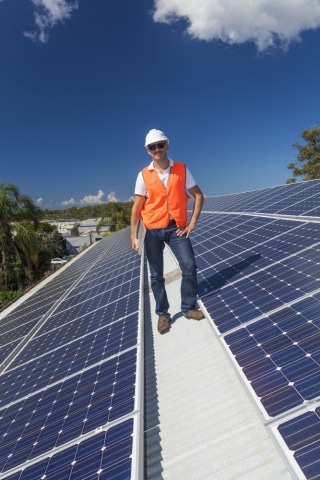Forget the U.S. war on coal, that’s not going so well for the team in the charcoal jerseys. The real shooting war has opened up against renewable energy, particularly solar, because of its potentially disruptive nature to vested interests.
Solar power is the go-to source for new generating capacity in the U.S. Some 930 megawatts of photovoltaic solar power was installed in the third quarter of 2013, a jump of 35 percent over last year, according to the Solar Energy Industries Association. And 2013 will go down as the year the United States surpassed uber leader Germany in new solar installations.
And the momentum shows no signs of slowing this year because home owners and companies are rapidly embracing the idea of harnessing power from the sun rather than from expensive and increasingly brittle power grids.
Solar panels are the new granite countertops in home building – an amenity that’s becoming a standard in residential housing, according to Bloomberg in a report. At least six of the 10 largest American homebuilders include panels in new housing construction today.
And what is a movement without stock market darlings? Companies such as Elon Musk’s SolarCity and SunEdison, to name just two, are often hot stocks on a daily basis.
INDUSTRY FEELS A CHILL
But there are two big threats to growth – from the power utilities and their century-old monopolies and from powerful conservative organizations that are keen to pick a fight against all things green.
In November Arizona sent a chill through the solar industry after its regulator allowed the state’s largest utility to impose a grid fee on homeowners that want to install rooftop panels.
The charge will end up costing consumers anywhere from $3 to $6 a month, according to Bloomberg New Energy Finance. The utility had wanted to charge as much as $50 per month.
In Hawaii, homeowners also face penalties for going solar. The Hawaiian Electric Co. announced in September that homeowners need to submit their solar plans beforehand and that they could be charged for any upgrades to help the utility deal with the influx of new power.
“Certainly any charge that negatively affects the economics of solar is a potential threat to growth,” said MJ Shiao, a senior analyst with GTM Research in an email. Now that there is a precedent for charging homeowners, Shiao said the next concern will be to see how transparent the utilities are when estimating the cost of solar on their grids.
The action is a shot over the bow for sustainability champions and so it is not surprising well-funded right-wing groups are entering the fray.
The industry trade group, the Edison Electric Institute, kicked it all off after it released a candid report last year outlining how the industry was facing “disruptive challenges” from renewables and, remarkably, envisioned a scenario where homeowners could cut the cord entirely from their utility.
While expecting customers to stay on the grid until renewable energy becomes “fully viable,” the group said “one can imagine a day when battery storage technology or micro turbines could allow customers to be electric grid independent.”
Enter the American Legislative Exchange Council, or ALEC. The controversial group with ties to the Koch brothers that specialises in writing legislation for state houses, wants to cast green-minded homeowners as “free riders.”
The lobby group will have a heavy agenda against renewables in 2014 that includes penalizing home owners, weakening state clean energy protections and undermining the Environmental Protection Agency.
“As it stands now, those direct generation customers are essentially free riders on the system,” John Eick, one of ALEC’s legislative analysts, told the Guardian. “They are not paying for the infrastructure they are using. In effect, all the other non-direct generation customers are being penalised.”
THREE KEY DRIVERS
Despite Darth Vader and the gang’s unleashing of the Death Star against renewables, it’s clear that solar energy has momentum going into the New Year, driven by high demand, falling costs and innovation.
Solar panel costs dropped by 60 percent and the cost of installations are falling sharply too. There is also a new app that makes buying solar panels as easy as buying a ticket on an airplane.
SolarCity, the brainchild of Elon Musk who is either the Thomas Edison of our time or Tony Stark of Ironman fame, has begun a pilot program that could prove to be the ultimate end run around the utility model.
Customers, beginning with industrial users, will be able to use massive battery packs from Musk’s Tesla Motors as backup power – thereby conveniently solving the problem of an intermittent sun.
And not all conservatives believe big business should have veto power over the power choices of consumers. Debbie Dooly, co-founder of the Atlanta Tea Party, made a splash in July when she stood with the Sierra Club in the fight for solar power in Georgia.
“The free market has been one of the founding principles of the Tea Party since it began and a monopoly is not a free market,” she told Climate Progress.
So let the battle be joined but it is clear the team in the green shirts has much momentum as 2014 unfolds.
Image credit: Solar technician on a roof via Shutterstock.
Subscribe to our newsletter
Stay up to date with DeSmog news and alerts







